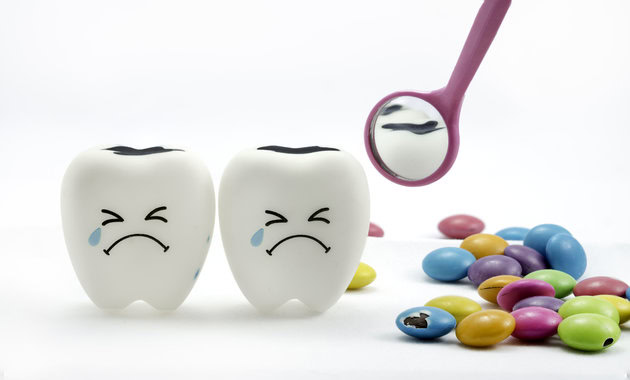
Tooth decay is a common health concern, second only to common cold that can affect any age group, but is more frequent in children and youngsters. Our mouth is filled with several types of bacteria, both helpful and harmful. The harmful ones play a major role in tooth decay. Tooth decay, if not treated in time, causes cavities in the teeth accompanied by pain and/or infection. It can lead to loss of the affected tooth.
Here are the common causes of tooth decay and cavity formation:
1 . Plaque
-Tooth decay occurs when the harmful bacteria start producing increased amount of acid in our mouth. This acid is formed by plaque which is made up of bacteria, saliva, and food particles.
-After we eat or drink, the bacteria start breaking down the food particles and the sugar they contain.
-As the bacteria feed, they produce acids. This acid attacks the outermost portion of the tooth, i.e., the enamel, and slowly destroys the teeth till the time they are not brushed or treated properly.
-If plaque is allowed to build up, not only it causes tooth decay, but also can lead to gum disease or pus formation at the end of the teeth or in the gums.
2 . Poor oral hygiene
Lack of proper oral hygiene also leads to tooth decay. Skipping the brusihing routine, Improper brushing technique, not flossing are some factors which cause tooth decay.
3 . Sugary, acidic foods and drinks
Sugar containing foods, such as cakes, biscuits, chocolates, and acidic drinks are the primary causes of tooth decay. The bacteria in your mouth break down the sugar and causes high acid production.
4 . Decreased saliva
Saliva helps in washing away food and harmful sugars, so it helps protect your teeth from decay. Decreased saliva production may be caused due to certain diseases or medicines, or by breathing through your mouth.
5 . Diabetes
Studies show that diabetic patients are more prone to dental problems including tooth decay, gum disease, and several other oral bacterial and fungal infections compared to non-diabetics.
WAYS TO PREVENT TOOTH DECAY
Tooth decay once occurs, cannot be reversed; however, its severity and sequelae can be controlled by following these measures:
Brush, floss, rinse, repeat
Brush your teeth twice daily (in the morning before or after breakfast, and in the night before bedtime) with fluoride toothpaste. Flossing between the teeth helps to remove plaque and leftover food particles that your toothbrush couldn’t reach and also reduces your risk of gum disease and cavities. A fluoride mouthwash can be added to your daily regimen, in order to reduce plaque and control tooth decay.
Avoid sugary, starchy food and drinks
It is better to avoid sticky foods or snacks mainly between meals or within an hour of going to bed, as they cause increased bacterial activity inside your mouth. Increased bacteria equals to increased risk of cavities!
Avoid tobacco and alcohol
Excessive tobacco affects the saliva production, which helps to keep your teeth clean, and alcohol can contribute to increased tooth wear and loss of enamel (dental erosion)
Get regular dental check-ups
Visit a dentist once in every six months or at least once in a year, so that all your dental problems can be treated before they get complicated and painful.